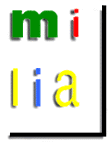Multimedia Monitor, March 1996

|
Milia 96: International Publishing and New Media Market Conference
9 - 12 February 1996: Cannes, France (Sponsored by
Reed Midem Organisation)
Interview with Janet Wikler
|
Michael Bush
Brigham Young University
Alpine Media
|
Copyright (c) 1996 - Future Systems Inc.
PO Box 26 - Falls Church VA 22046 USA
Phone 703/241-1799 - Telex 4996279 - Fax 703/532-0529
|
Much of the new media attention is split between CD-ROM on the one
hand and the Internet on the other. Therefore, I arranged an interview
with Janet Wikler, one of the presenters in the conference on CD-ROM/online
hybrids. Janet is just completing an in-depth study on the hybridization
phenomenon. Janet is president of Wikler and Company, an interactive media
business consulting firm, and has a solid record in many aspects of the
publishing industry. Most recently, before starting her own consulting
business, she served as worldwide group vice president and director of
Advanced Media for HarperCollins Publishers, a subsidiary of News Corporation.
Prior to that, she was senior vice president and director of Strategic
Planning for Simon & Schuster, the publishing arm of Paramount Communications
(now owned by Viacom).
MB: Someone told me last evening that CD-ROM is already passé,
a technology that will choke on its own glut in the marketplace. Based
on your study, what will we see? Hybrid products? Or will we go straight
to online delivery as some are predicting?
JW: I don't believe that CD-ROM is finished. The economics suggest
that combinations of local and online media will be with us for a very
long time, although what is stored locally and what is online may change
over time. In the short term, we have to keep an eye on developments such
as cable modems, but my study has convinced me that we will see many hybrids
in the next few years.
Nonetheless, caution is in order for those considering hybrids as a
publishing option. Some see this approach as the solution to the financial
and marketing difficulties they are encountering in CD-ROM or online publishing.
Unfortunately, it's not easy to take two products that aren't making money
and combine them to create one that will!
MB: So what business approach should content providers consider?
JW: Hybrids offer the possibility of multiple revenue sources,
and that can be a powerful advantage. CD-ROM and online publishing are
two different businesses, however, with very different economic models.
Unless you understand the differences and use them to your advantage, you'll
probably have trouble making money. It's important to determine where value
lies for the consumer and to price accordingly.
Publishers of CD-ROM/online hybrids are trying to combine the advantages
of CD-ROM with those of online connectivity. The results can be wonderful,
but hybrids also add complexity. As soon as you connect a computer, a CD-ROM,
and an online service or site, there are new opportunities for things to
go wrong.
MB: How should we be looking at it then?
JW: To a large extent, the CD-ROM versus online debate is about
content versus connectivity. It's also about being up-to-the-minute with
information. We can place content on the CD-ROM and then download additional
content periodically to work with the information on the CD-ROM and update
it. Hybrids also let us distribute high-bandwidth content on CD-ROM, with
embedded links and programs that let people connect to each other and play,
chat, or collaborate in shared multimedia environments.
MB: What did you look at in your study?
JW: I took a broad approach. I looked at products and talked
with people who are creating and using them. I also conducted an extensive
literature search.
MB: What do you see as the most significant aspect of your
findings?
JW: The quest for seamlessness - something that is very difficult
to accomplish - is the aspect that first comes to mind. The difficulties
are due mostly to the limitations of the typical user's platform. Eight
megabytes of RAM just isn't enough. Often you have to close one piece of
content or functionality in a hybrid application in order to run another.
MB: What advice would you give someone considering creating
a hybrid product?
JW: It doesn't make sense to create hybrid products out of desperation.
To do so will "complexify" a business significantly. Furthermore,
most CD-ROMs act like products, not services; and once you provide an online
site, you are definitely offering a service. This means frequent updating,
technical support, and so forth.
MB: Are your clients making the necessary adjustments?
JW: Many are having trouble making the move from product to service.
A big mental shift needs to take place. The production-to-market cycle
of CD-ROMs, like most products, goes from development, to freeze and manufacture,
to marketing. As a service, however, an online offering is never "in
the can." When you add customers, your costs go up, rather than down.
MB: Do you see hybrids changing the traditional relationship
between producer and consumer?
JW: With hybrids, there is less need for intermediate layers
in the distribution channel. Producers can communicate directly with customers,
making it easier for them to respond to their needs. While this model presents
opportunity, it also implies responsibility, which may involve expenses
the producer does not have today - such as the cost of communicating directly,
frequently, and individually with customers. q
